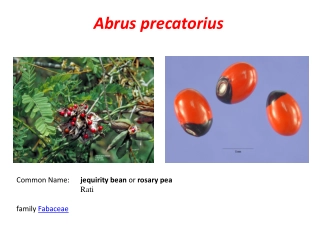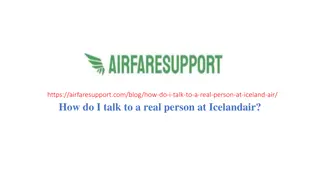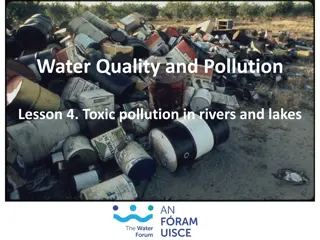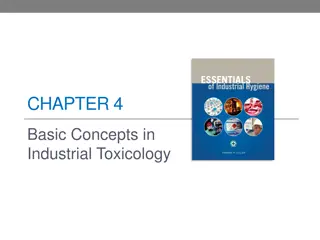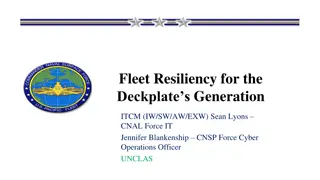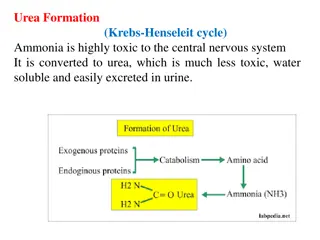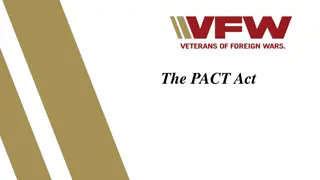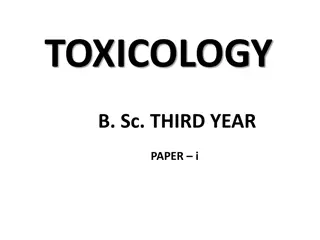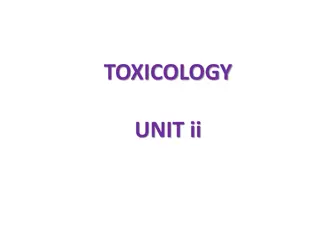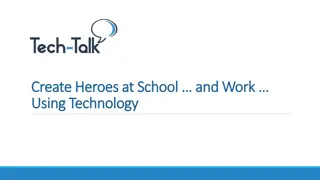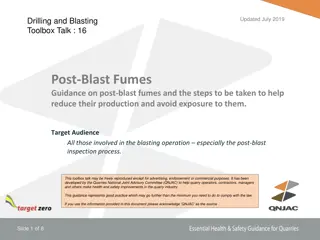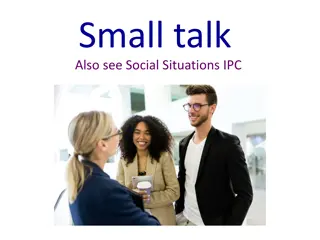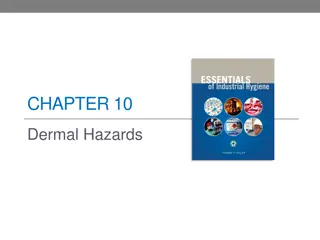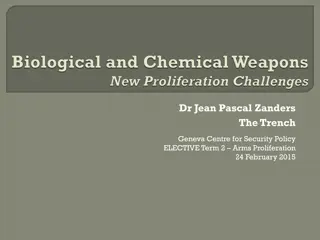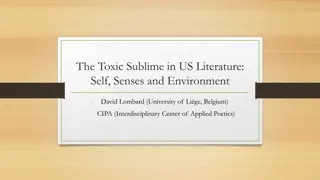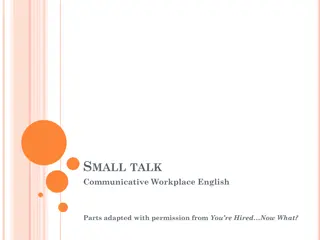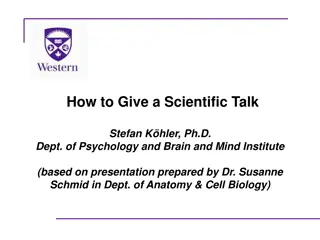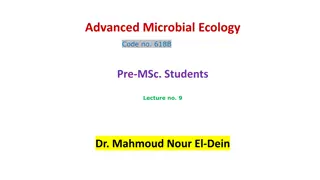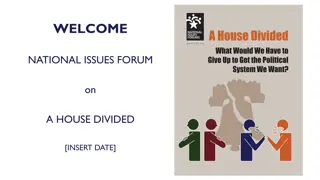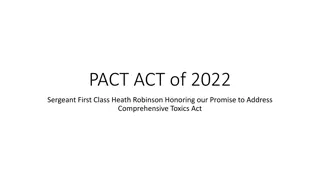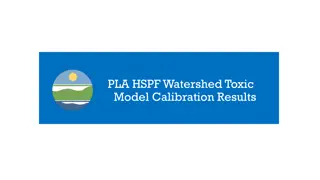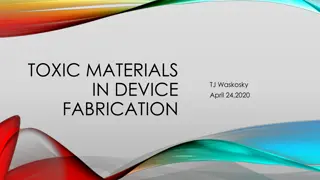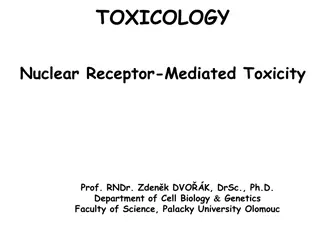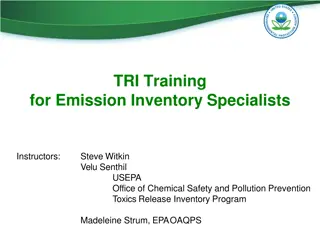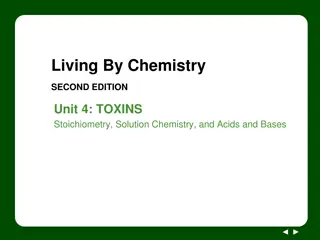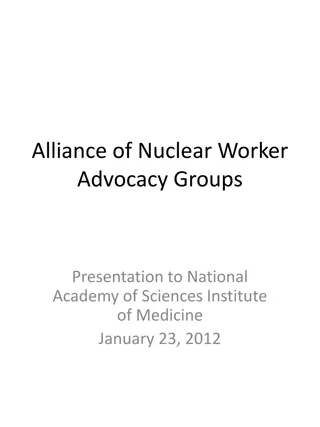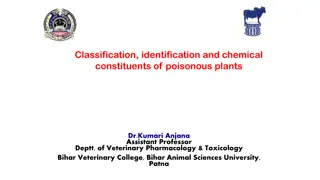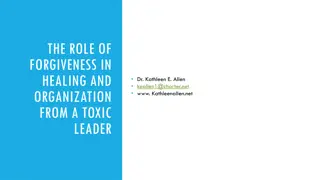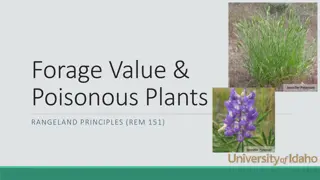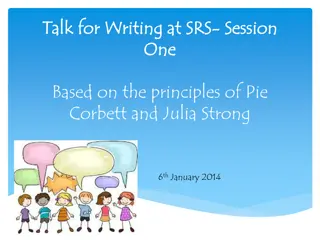Abrus precatorius
Abrus Precatorius, also known as the jequirity bean or rosary pea, is a highly toxic plant that is found throughout the tropics. Its seeds are used in jewelry and necklaces, but they can be fatal if ingested. This article explores the distribution, toxic principle, animals affected, mechanism of tox
18 views • 23 slides
You Talk The Talk But Can you Walk The Walk?
\u201cShow Me the Skills!\" \u2013 that could be the rallying cry for recruiters in 2024 as they shift from traditional resumes to skill-based assessments.\n \nWhy?\n \nIn 2024, it's all about what you can do, not just what you say you can do.\n
6 views • 6 slides
How do I talk to a real person at Icelandair?
Are you new to Iceland Airways? Don't worry about this page which makes it very useful to resolve all of your queries like How do I talk to a real person at Icelandair? Dial on OTA 1-800-970-3794.
3 views • 6 slides
Understanding Feminism, Sexism, and Toxic Masculinity - A Reflection on Gender Equality
Explore the concepts of feminism, sexism, and toxic masculinity through activities and discussions, challenging misconceptions and promoting gender equality. Reflect on learning and origins of misconceptions to foster a more inclusive society.
0 views • 7 slides
Understanding Toxic Pollution in Rivers and Lakes
Toxic pollution in rivers and lakes is a pressing environmental issue caused by various pollutants such as metals, pesticides, chemicals, and microbial contaminants. These pollutants can have detrimental effects on aquatic life, human water use, and health. Learn about the impact of toxic pollutants
2 views • 20 slides
Understanding Basic Concepts in Industrial Toxicology
Industrial toxicology is a vital field that studies the effects of various agents on organism health through mechanisms of action, toxicokinetics, and more. It explores toxic chemical absorption, distribution, metabolism, and elimination, as well as toxic effects on major organ systems. Learn about
0 views • 35 slides
Expansion of Health Care Eligibility for Toxic-Exposed Veterans
This Title expands the eligibility criteria for Toxic-Exposed Veterans in 38 U.S.C. 1710 by refining the definition of Vietnam-era herbicide-exposed veterans to include those who performed covered service in specified locations. It introduces three new categories of eligible veterans based on toxic
1 views • 19 slides
Challenges and Solutions in Fleet Resiliency for the Deckplate's Generation
Fleet resiliency for the deckplate's generation faces training gaps, barriers, motivation battles, and toxic leadership issues. Lack of foundational skills and reliance on technical documentation hinder self-sufficiency. Toxic leadership and communication barriers impact motivation and retention. De
2 views • 9 slides
Urea Biosynthesis and the Krebs-Henseleit Cycle in the Liver
Urea is synthesized in the liver through a series of enzymatic steps known as the urea cycle or Krebs-Henseleit cycle. This process involves converting toxic ammonia into urea, a less toxic and water-soluble compound that can be easily excreted in urine. The liver plays a crucial role in urea biosyn
1 views • 20 slides
Exploring How Language Influences Thought: Insights from TED Talk
Language plays a significant role in shaping our thoughts and perceptions, as discussed by Lera Boroditzky in her TED Women 2017 talk. She highlights how linguistic differences in languages like German and Spanish can impact cognitive processes and cultural perspectives. Boroditzky's insights shed l
0 views • 12 slides
Understanding The PACT Act and Its Impact on Veterans
The PACT Act, named after Sgt. First Class Heath Robinson who succumbed to lung cancer from toxic exposure, is a law enhancing VA benefits for veterans exposed to harmful substances. It expands VA health care eligibility, ensures toxic exposure screenings, and mandates research studies on veteran he
0 views • 24 slides
Introduction to Toxicology: Science and Impact on Living Organisms
Toxicology is the study of adverse effects of chemicals on living organisms. It assesses probability of occurrence, quantitatively and qualitatively analyzing toxic effects. Toxicants are agents causing harmful responses in biological systems. Environmental toxicology focuses on pollutants' effects
0 views • 12 slides
Microsoft Bookings Tech Talk: Enhance Customer Experience and Boost Business Efficiency
Join the Microsoft Bookings Tech Talk event featuring presenter Jason Hetterle. Explore how Microsoft Bookings helps small businesses manage appointments efficiently with real-life use case examples. Learn about customer experience optimization, configuration tips, and get your questions answered. D
0 views • 6 slides
Overview of Toxicology: Understanding Chemical Risks and Health Impacts
Toxicology is a crucial field that assesses the effects of various toxic substances on human health and the environment. From heavy metals to solvents, radiation, pesticides, and animal toxins, this discipline plays a vital role in identifying and managing risks associated with exposure to harmful c
0 views • 25 slides
Empower Students with Tech-Talk: Enhancing Skills for Success
Tech-Talk Database provides a platform for students, faculty, and staff to access up-to-date articles and videos on technology, boosting their skills and confidence for better academic performance and career opportunities. Students benefit from learning essential skills like Microsoft Office and int
4 views • 7 slides
Post-Blast Fumes: Guidance on Mitigating Toxic Gases in Drilling and Blasting Operations
Explosives used in blasting operations generate post-blast fumes, which can contain toxic gases like oxides of nitrogen (NOx) and carbon monoxide. This toolbox talk provides guidance on reducing fume production and avoiding exposure, with a focus on the physiological effects of different gas compone
0 views • 11 slides
Understanding and Taming Stress: A Mindful Approach
Explore the dynamics of stress from a mindful perspective presented by Michele Guerra, MS, CHES. Learn strategies to tame self-defeating thinking patterns, practice reframing techniques, create affirmations, and engage in mind-taming meditations. Discover the ABCs of stress management, the power of
0 views • 22 slides
The Art of Small Talk: Navigating Social Situations with Ease
Small talk serves numerous purposes, such as meeting new people, being friendly, and maintaining relationships by engaging in light conversations. It should not delve into personal, sensitive, or controversial topics. Suitable small talk subjects include recent films, local sports teams, or common i
0 views • 23 slides
Understanding Dermal Hazards: Anatomy, Toxic Absorption, and Health Effects
Explore the key anatomy and physiology of the skin, learn how toxic agents are absorbed, understand the adverse health effects of skin exposure to hazardous agents, discover methods of dermal exposure assessment, and develop controls to minimize skin exposure to dangerous substances.
0 views • 26 slides
Understanding Chemical and Biological Weapons Proliferation Risks
Exploring the risks associated with chemical and biological weapons proliferation, covering topics such as war scenarios, terrorism, dual-use issues, international conventions, and emerging threats. This includes discussions on the use of toxic chemicals in various settings, along with examples of p
0 views • 8 slides
Talk-Line: A Helpline for Students in Grades 3-5
Talk-Line is a resource available for students in Grades 3-5 who are experiencing thoughts of self-harm, being harmed by others, or needing help. This service provides a safe space for students to talk to a trained listener for support and assistance. It is essential for students to reach out to tru
0 views • 12 slides
Exploring the Toxic Sublime in US Literature
Investigating the aesthetic dimensions of Thoreau's environmental philosophy and its capacity to blur boundaries between natural and technological landscapes, David Lombard's research delves into the concept of the toxic sublime in literature. By redefining the sublime for the Anthropocene era, the
0 views • 10 slides
Expert Tips for Delivering a 15-Minute Talk Effectively
Discover practical advice for giving an impactful 15-minute talk in a limited timeframe. Learn how to engage your audience, structure your presentation, and deliver key points effectively. From crafting a compelling introduction to highlighting significant results, this guide will help you optimize
0 views • 23 slides
Understanding Small Talk in the Workplace
Small talk in the workplace involves engaging in polite conversations about unimportant or non-personal topics. Common small talk topics include the weather, sports, work, news, family, and hobbies. It plays a crucial role in building rapport and fostering a positive environment among colleagues.
0 views • 65 slides
Effective Scientific Talk Presentation Tips
Learn to give a scientific talk successfully by understanding your topic, audience, and goals. Gather essential materials, draft an outline, and structure your talk clearly from beginning to end. Practice speaking fluently without relying on reading or memorization to engage your audience effectivel
0 views • 14 slides
Understanding Heavy Metals and Their Impact on Organisms in the Environment
Heavy metals, such as zinc and copper, persist in the environment posing health risks to organisms. Industrial activities release toxic metals into water sources. Microorganisms can interact with heavy metal ions, altering their toxicity and resistance. Essential heavy metals are needed in small amo
0 views • 24 slides
National Issues Forum on a House Divided
A House Divided forum focuses on the toxic nature of public discourse, aiming to reduce dangerous talk online and in media. Participants discuss potential actions such as regulating hate speech, promoting diverse viewpoints, and protecting freedom of speech in various settings, including college cam
0 views • 21 slides
PACT ACT of 2022: Addressing Comprehensive Toxics Exposure for Veterans
The PACT ACT of 2022, spearheaded by Sergeant First Class Heath Robinson, aims to address comprehensive toxics exposure issues for veterans. The bill includes provisions such as expanded healthcare, improved VA services, recognition of burn pit exposure, enhancement of compensation for Persian Gulf
0 views • 22 slides
If you are looking for Gel X in Los Altos Hill
If you are looking for Gel X in Los Altos Hill, 4hands Beauty is the first clean and non toxic nail salon in North Los Altos! We don't use acrylic and other harsh materials in our work, so there is no harmful evaporations and toxic smell in our salon
0 views • 6 slides
PLA HSPF Watershed Toxic Model Calibration Results Summary
This summary provides insights into the calibration results of the PLA HSPF Watershed Toxic Model. It includes information on the Green/Duwamish River sub-watersheds, estimated loads to LDW toxic load reach 604, and the statistical calibration targets for HSPF toxic simulations. The calibration sequ
0 views • 10 slides
Effects of Toxic Materials in Device Fabrication and Environmentally Friendly DSSC Options
Negative effects of toxic materials used in device fabrication processes include reproductive health issues, cancer risks, and respiratory abnormalities for workers. Dye Sensitized Solar Cells (DSSC) present a more cost-effective and simpler alternative to silicon solar cells, with metal sensitizers
0 views • 17 slides
Nuclear Receptor-Mediated Toxicity: Molecular Insights and Implications
TOXICOLOGY research on Nuclear Receptor-Mediated Toxicity by Prof. Zdeněk Dvořák delves into the evidence, molecular properties, structures, and signaling pathways of nuclear receptors such as Aryl Hydrocarbon Receptor (AhR). Detailed information on the impact of AhR-mediated toxicity, including
0 views • 19 slides
Understanding Toxics Release Inventory (TRI) Program
Toxics Release Inventory (TRI) program is a reporting system that tracks the waste management of toxic chemicals posing threats to human health and the environment. It was created in response to tragic incidents like the Bhopal disaster, aiming to provide information on toxic releases from industria
0 views • 26 slides
Understanding Toxicity: Mole-Mass Conversions in Chemistry
Explore the toxic nature of arsenic compounds and learn how to convert between moles and mass in this chemistry lesson. Understand the relationships between mass, moles, and the number of particles in a substance, and practice converting moles to mass and vice versa. Work in pairs to delve into the
0 views • 10 slides
Alliance of Nuclear Worker Advocacy Groups Presentation on Toxic Substances Exposure
Presentation by Alliance of Nuclear Worker Advocacy Groups addressing the need to develop a matrix of toxic substances and related diseases to facilitate timely compensation for DOE workers. Emphasizes the importance of thorough documentation and recognition of exposure risks. Discusses applicable l
0 views • 10 slides
Managing Toxic People in Your Organization
Understanding the three types of individuals - wise, foolish, and evil - can help you identify and handle toxic people effectively. Limit your interactions with foolish individuals, remove toxic people completely, and surround yourself with wise individuals to build a healthy organizational culture.
0 views • 8 slides
Overview of Poisonous Plants: Classification, Identification, and Toxic Chemical Constituents
This detailed chapter delves into the classification, identification, and chemical constituents of poisonous plants, shedding light on natural toxins, alkaloids, and toxic principles. It covers the role of alkaloids in plant toxicity, highlighting specific types such as piperidine alkaloids, pyrroli
0 views • 17 slides
The Role of Forgiveness in Healing and Organization Recovery from Toxic Leadership
Toxic leaders can leave lasting damage in organizations even after they are gone. Forgiveness plays a crucial role in healing individuals and the organization as a whole. It is an internal choice that allows for the transformation from passive hope to active hope. Creating conducive conditions for f
0 views • 13 slides
Understanding Forage Value and Poisonous Plants in Rangelands
Explore the factors influencing plant nutritive value, such as cell structure, lignification, and anti-quality factors. Learn about the impact of toxic plants on livestock, including death, birth defects, and neurological effects. Discover the types and characteristics of toxic or poisonous plants c
0 views • 13 slides
Enhancing Writing Skills Through Talk for Writing Approach
Discover the key principles of Talk for Writing, understand the importance of Shared Writing, and explore how to improve the teaching and learning of writing in your classroom. Learn about the challenges children face in writing compared to reading and how Talk for Writing can help externalize the i
0 views • 27 slides
